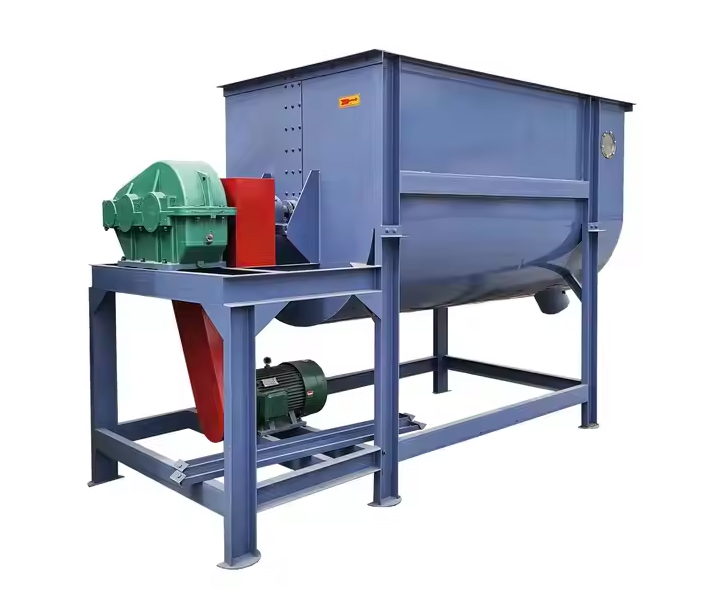
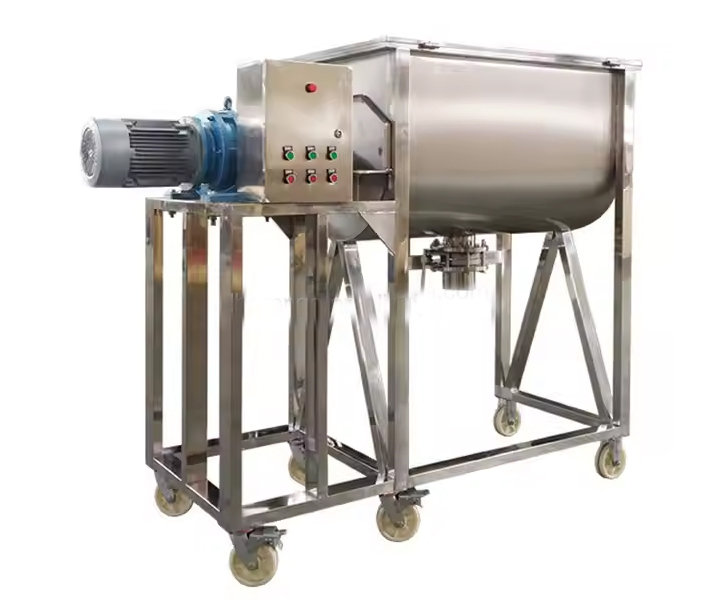
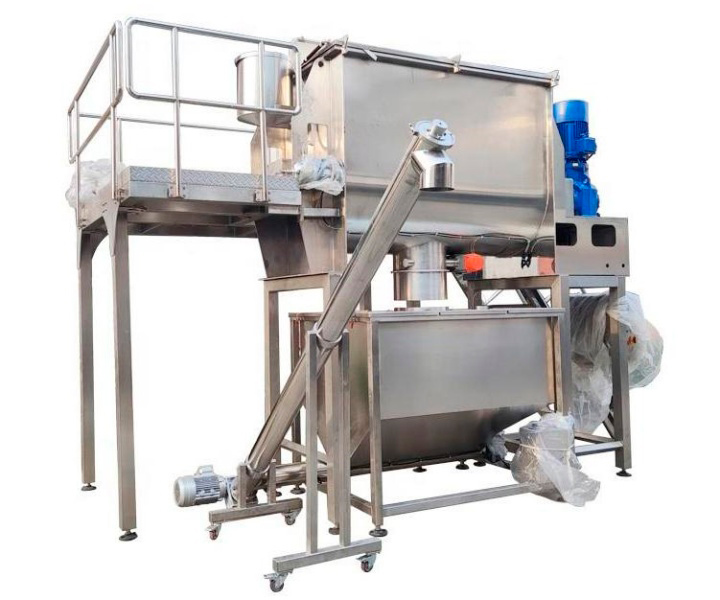
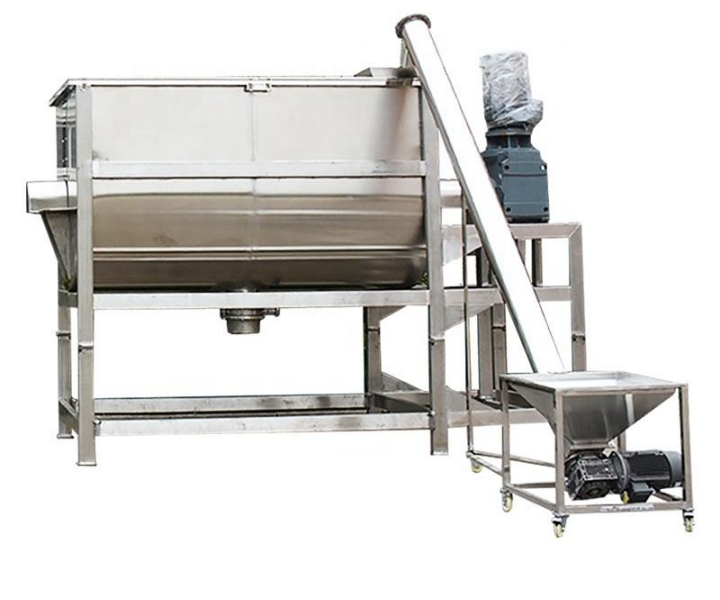
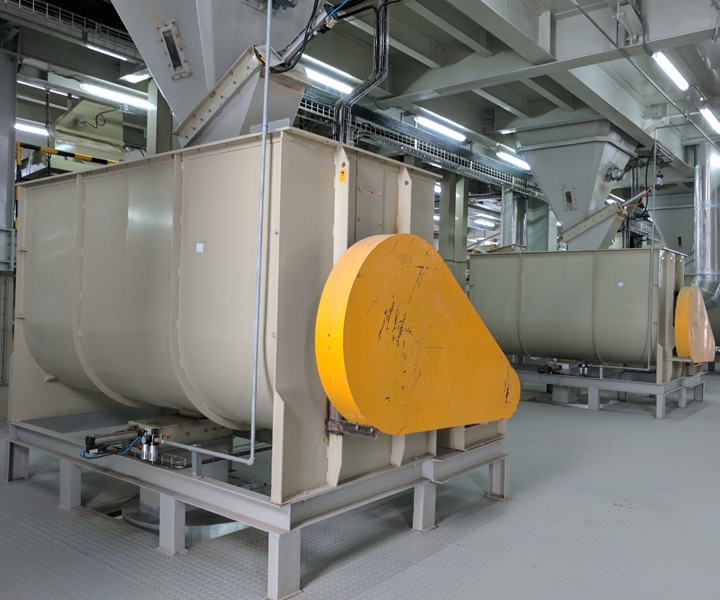





Consists of inner and outer helical ribbons that are designed to allow materials to be continuously and fully mixed. It is an industrial mixing equipment used to mix dry powders, granules and other solid materials.
![]()
![]()
Price:$1500.00-$6,500.00/Set
Consult now and enjoy a 10% discount
Mixing time: 8-20min
One-time mixing: 100-6000 (kg) (If it exceeds 6000kg, it can be customized according to needs)
Mixing speed: 15-60r/min
Voltage: 380V/400V/480V
Power: 3-75kw
Feeding method: manual feeding, automatic feeding or other methods
Discharging method: manual unloading, automatic unloading or other methods
Application: Widely used in livestock and poultry breeding industries and feed processing plants to mix various feed raw materials, including grain, soybean meal, fish meal, vitamins, minerals, etc.
Commitment: Free Shipping/5 Days Delivery/30-Day Returns/Support Customization
Feed stirring mixer is designed to mix various types of animal feed ingredients thoroughly. It typically consists of a mixing chamber where different components such as grains, minerals, vitamins, and other additives are combined. The stirring or mixing mechanism inside the chamber ensures that the ingredients are evenly distributed to create a uniform feed mixture.
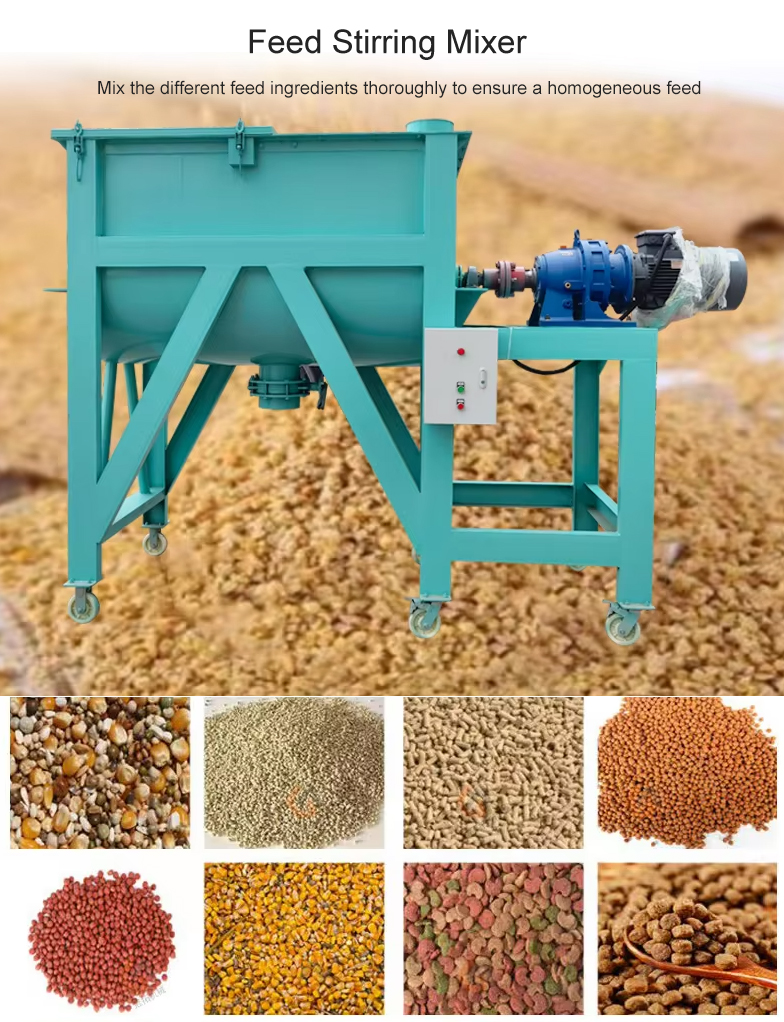
Feed stirring mixers can be designed for batch mixing (mixing a specific quantity at a time) or continuous mixing for an ongoing production process, reducing mixing time and increasing overall productivity compared to manual methods.
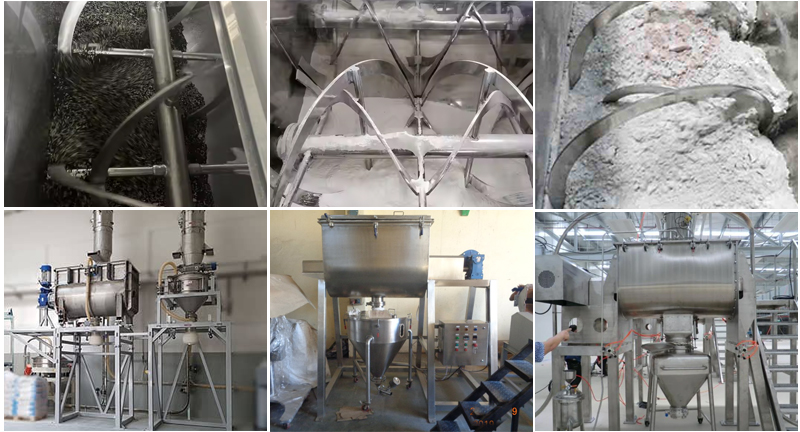
Types of feed stirring mixer
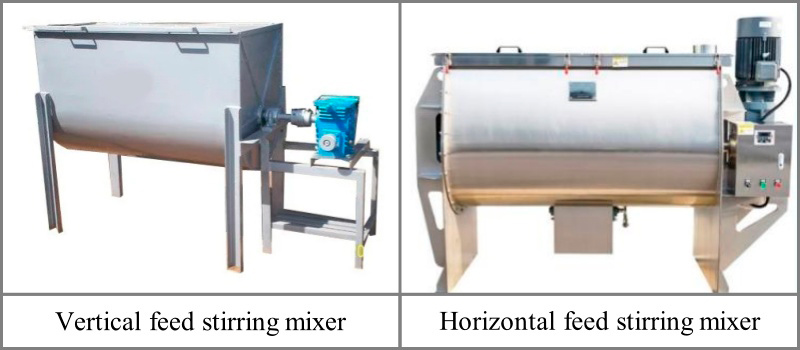
Feed stirring mixers can generally be divided into two types: vertical and horizontal.
Vertical feed stirring mixer: Vertical feed stirring mixer is a vertically arranged device whose main features are compact structure and small footprint. It usually consists of a vertical mixing drum and a transmission system. The vertical feed stirring mixer is suitable for small-scale farms or places with limited space.
Horizontal feed stirring mixer: Horizontal feed stirring mixer is a horizontally arranged equipment. Its main feature is that the mixing drum is located in a horizontal position, which usually has a larger capacity and mixing effect. It usually consists of a horizontal mixing drum, transmission system, feed port, discharge port and other parts. It is suitable for large-scale breeding farms or occasions that require large batches of feed mixing.
Materials of feed stirring mixer
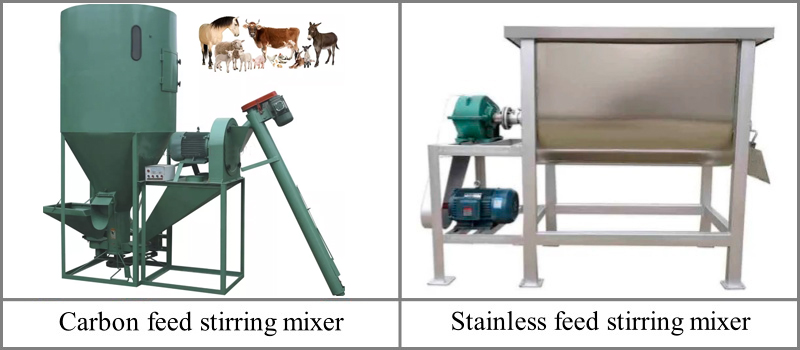
Feed stirring mixers are mainly made of carbon steel and stainless steel.
Carbon feed stirring mixer: This mixer is generally suitable for general feed processing and mixing processes. They have low cost, easy processing and maintenance, and are widely used in fields such as agriculture and animal husbandry. However, carbon steel is susceptible to corrosion and oxidation, so in some special environments, such as wet or corrosive conditions, additional protective measures or regular maintenance may be required.
Stainless feed stirring mixer: Commonly used stainless steel grades include 304 and 316. It is suitable for occasions with high feed requirements, such as food processing industry and feed production under special environments. Stainless steel has the advantages of corrosion resistance, high temperature resistance and easy cleaning, which can ensure the hygiene and quality of feed. Although the mixer is more expensive, they are more durable and can meet industry standards with stricter hygiene requirements.
Feed stirring mixer has a wide range of application scenarios in the feed industry. Here are some of the main application areas:
1. Animal feed production
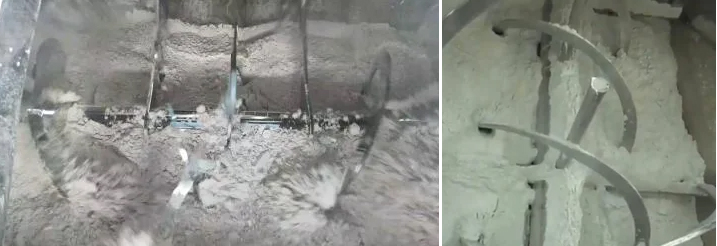
Poultry feed: used to mix feed for poultry such as chickens, ducks, geese, etc. to ensure balanced nutrition.
Pig feed: suitable for different growth stages of pigs, mixing various ingredients to meet their nutritional needs.
Cattle and sheep feed: used to mix grass, pellet feed and additives to ensure the health of ruminants.

2. Aquatic feed
Fish feed: used to produce fish feed to ensure uniform distribution of nutrients and promote fish growth.
Shrimp feed: mix specific nutrients to increase the growth rate and survival rate of shrimp.
3. Pet food
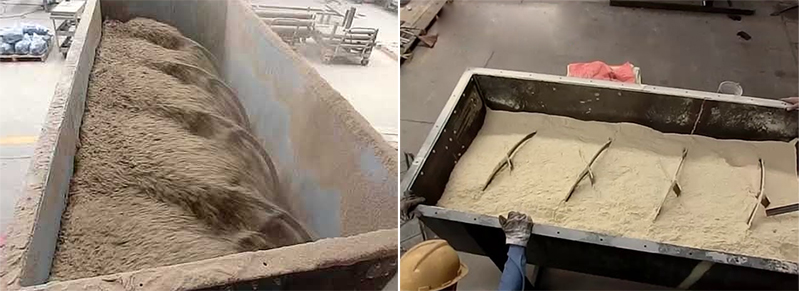
Dog and cat food: used to mix meat, grains and additives to ensure the nutritional integrity of pet food.
4. Organic fertilizer
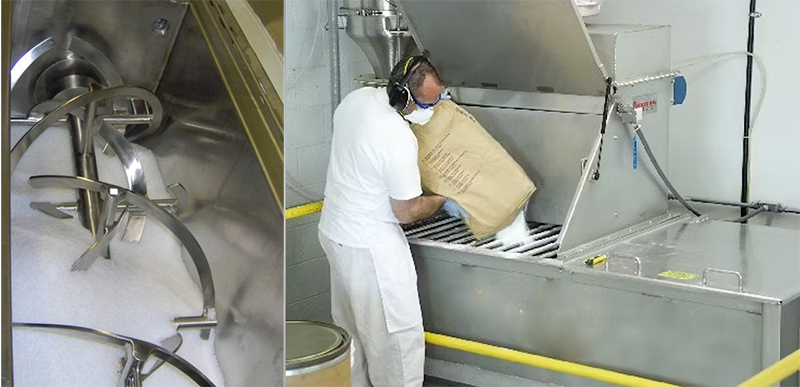
Organic material mixing: when producing organic fertilizer, mix different organic materials such as crop residues, animal manure, etc. to ensure the uniformity and effect of fertilizer.
5. Feed additives
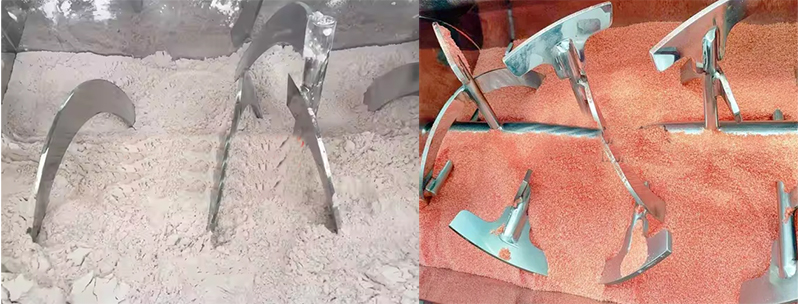
Vitamins and minerals: used to evenly mix various vitamins, minerals and drugs into the basic feed to improve the nutritional value of the feed.
6. Feed mills

Massive production: In feed mills, feed mixers are used to achieve large-scale feed production to meet market demand.
The working principle of the feed stirring mixer is basically similar. Whether it is a vertical or horizontal feed stirring mixer, they all mix the feed ingredients through the rotation of the stirring blades. The specific working principle is as follows:
Adding materials: First, add the feed ingredients to be mixed into the mixing drum through the feeding port. The feed port is usually located on the top or side of the feed stirring mixer and can be fed manually or automatically.
Mixing blade rotation: Once the feed ingredients are added to the mixing drum, the mixing blades start to rotate. The mixing blades are usually fixed on the shaft inside the mixing drum and driven by a motor or other power source. As the mixing blades rotate, they push the feed ingredients toward the edge of the mixing drum and throw them up or down.
Mixing process: The feed raw materials are continuously thrown and pushed by the mixing blades in the mixing drum to achieve the purpose of mixing. The rotation direction and speed of the mixing blades cause the feed raw materials to continuously tumble, collide and cross in the mixing drum, thereby uniformly mixing different types and proportions of feed raw materials.
Discharge: After mixing is completed, the mixed feed will be discharged from the mixing drum through the discharge port. The discharge port is usually located at the bottom or side of the feed stirring mixer and can be discharged manually or automatically.
Good mixing effect
The feed stirring mixer can evenly mix different types and proportions of feed ingredients to ensure that the various ingredients in the feed are fully dispersed. It can effectively break the clumps and aggregation of feed ingredients, make various nutrients in the feed evenly distributed, and improve the stability and uniformity of the feed.
Short mixing time
The feed stirring mixer adopts an efficient mixing blade and mixing drum structure, which can complete the mixing process in a short time. Compared with traditional manual or mechanical mixing, the feed mixer can greatly shorten the mixing time and improve production efficiency.
Easy to operate
The operation of the feed stirring mixer is relatively simple. Usually you only need to add the feed ingredients into the mixing drum, set the mixing time and speed, and then start the machine. Operators only need to master basic operating skills to perform normal mixing operations.
Strong adaptability
The feed stirring mixer is suitable for mixing various types and proportions of feed ingredients, and the feed formula can be adjusted as needed. Whether it is powdered feed, pellet feed or soaked feed, the feed stirring mixer can effectively mix it evenly.
Low energy consumption
Feed stirring mixers are usually driven by motors or other power sources and have relatively low energy consumption. In addition, the feed stirring mixer can make full use of the gravity and power of the feed ingredients during the mixing process, reducing energy waste.
Improve feed quality
Feed mixed with a feed stirring mixer can improve the stability, palatability and digestibility of the feed. The mixed feed can evenly distribute various nutrients, reduce the selective intake of feed by animals, improve the utilization efficiency of feed, and promote the healthy growth.
| Model | LHY-0.25 | LHY-0.5 | LHY-1 | LHY-1.5 | LHY-2 | LHY-3 | LHY-4 | LHY-6 | LHY-8 | LHY-10 |
| One-time mixing (kg) | 100-150 | 200-300 | 400-600 | 600-900 | 800-1000 | 1200-1800 | 1600-2400 | 2400-3600 | 3200-4800 | 4000-6000 |
| Mixing time (min) | 8-20 | 8-20 | 8-20 | 8-20 | 8-20 | 8-20 | 8-20 | 8-20 | 8-20 | 8-20 |
| Mixing speed (r/min) | 60 | 55 | 45 | 40 | 35 | 25 | 25 | 20 | 15 | 15 |
| Motor power (kw) | 3-5.5 | 4-11 | 7.5-15 | 11-18.5 | 15-22 | 18.5-30 | 22-37 | 37-55 | 37-55 | 45-75 |
| Weight (kg) | 500 | 900 | 1800 | 2500 | 3200 | 4100 | 5100 | 6300 | 7500 |
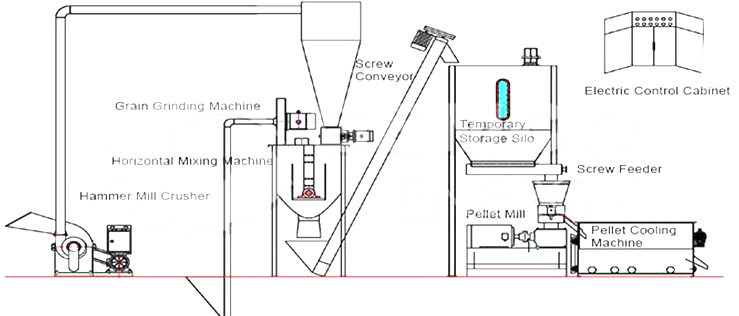
The mixing process refers to the method and process of weighing and mixing the raw materials of each component in the feed formula and then putting them into the feed mixer for uniform mixing. According to the continuity of the mixing process, the mixing process of the feed factory can be divided into intermittent mixing process and continuous mixing process.
Differences between batch and continuous process
| Feature | Batch Mixing | Continuous Mixing |
| Operation Method | Batch processing | Continuous process |
| Mixing Machine | Batch Mixing Machine | Continuous Mixing Machine |
| Time Efficiency | Relatively slow | More efficient |
| Control Precision | Usually high | Depends on equipment |
| Equipment Complexity | Simple operation | More complex |
| Applicability | Small-batch, periodic | Large-scale, continuous |
| Mixing Quality | Generally good | Some uneven mixing |
| Cleaning/Maintenance | Relatively easy | May require frequent |
| Energy Consumption | Stop after each batch | Continuous operation |
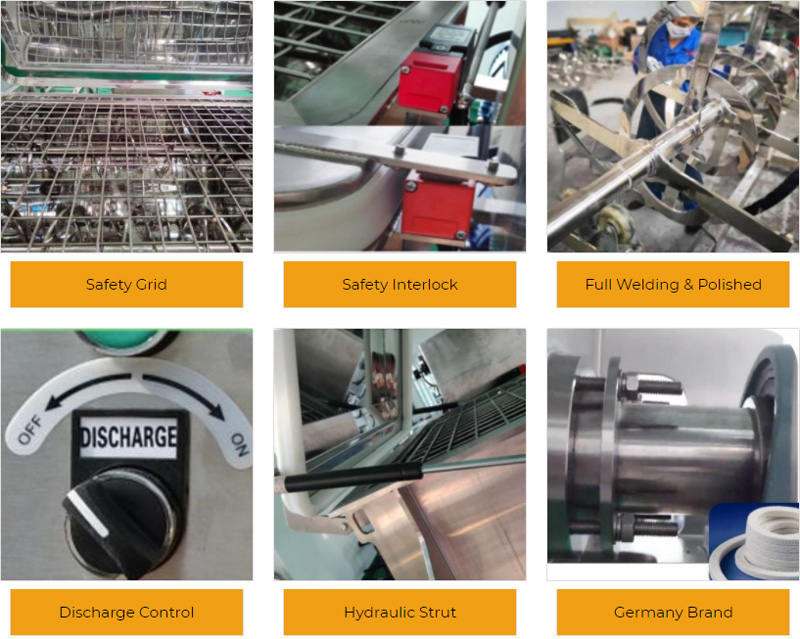

A certain pig farm is a modern breeding enterprise focusing on pork production. In order to improve the quality and nutritional balance of feed, they introduced an efficient feed stirring mixer. This mixer features advanced mixing technology and intelligent control systems to meet the needs of pig farms. After the introduction of feed stirring mixer, the feed processing process of pig farms has been significantly improved. The mixer uses its excellent mixing effect to evenly mix various feed ingredients to ensure that various nutrients in the feed are fully dispersed. This improves the stability and uniformity of feed, enables pigs to obtain a balanced nutritional supply, and promotes healthy growth and improved production performance of pigs.
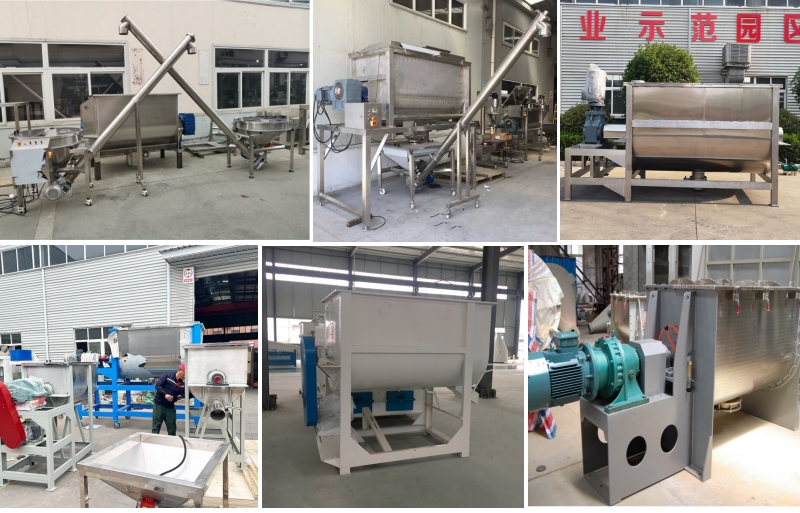
Xinxiang Dahan feed stirring mixer manufacturer is a company specializing in manufacturing vibration equipment and one of the feed stirring mixer manufacturers. The company has many years of industry experience and advanced production technology, and is committed to providing high-quality, reliable and efficient products. The feed stirring mixer adopts high-quality materials and precision processing technology, with stable performance and long life. This product has reasonable design, easy operation and excellent mixing effect. Xinxiang Dahan Dry Powder Mixer has won wide recognition from customers for its excellent manufacturing capabilities and good after-sales service.
After starting the mixer, check its running direction timely to avoid turning reversely.
The load of the mixer must not exceed the effective volume.
After using for 15 days for the first time, release the lubricant oil and clean the oil tank; change the lubricant oil in the speed reducer every three months, and fill grease to the bearing every two months.
Minor repair of the mixer is needed after 1800 hours’ normal running, mainly to check the lubrication point or replace the wearing parts; overhaul is needed after 4000 hours’ normal running, mainly to disassemble to check and clean all the components, replace or rectify all the wearing parts and standard parts.
Address:China,Yanjin county forest park gate to the west 1000 meters north road.